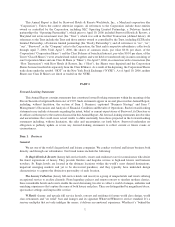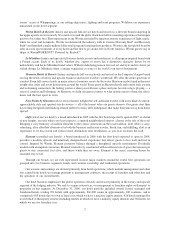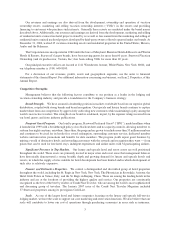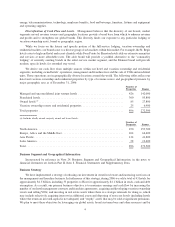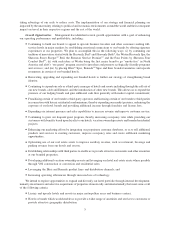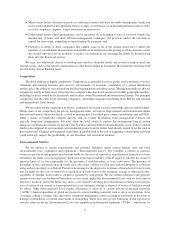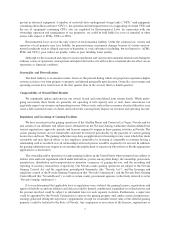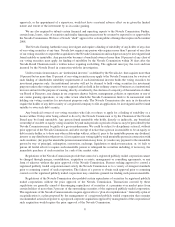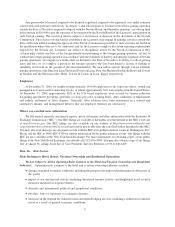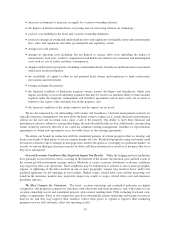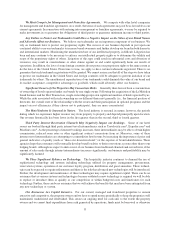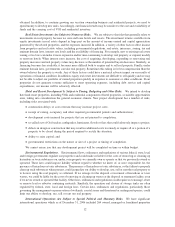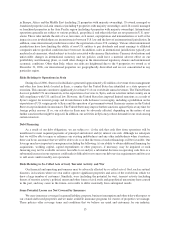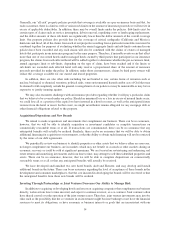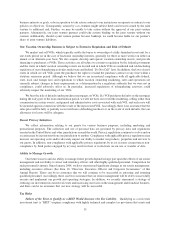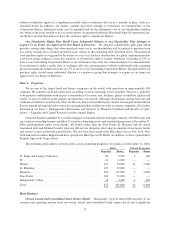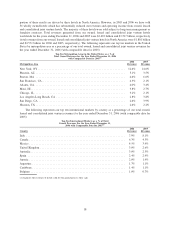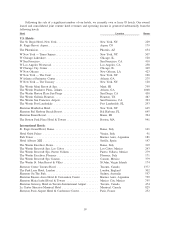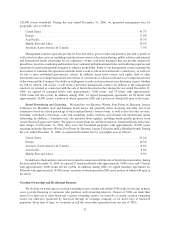Starwood 2006 Annual Report Download - page 18
Download and view the complete annual report
Please find page 18 of the 2006 Starwood annual report below. You can navigate through the pages in the report by either clicking on the pages listed below, or by using the keyword search tool below to find specific information within the annual report.We Must Compete for Management and Franchise Agreements. We compete with other hotel companies
for management and franchise agreements. As a result, the terms of such agreements may not be as favorable as our
current agreements. In connection with entering into management or franchise agreements, we may be required to
make investments in or guarantee the obligations of third parties or guarantee minimum income to third parties.
Any Failure to Protect our Trademarks Could Have a Negative Impact on the Value of our Brand Names
and Adversely Affect our Business. We believe our trademarks are an important component of our business. We
rely on trademark laws to protect our proprietary rights. The success of our business depends in part upon our
continued ability to use our trademarks to increase brand awareness and further develop our brand in both domestic
and international markets. Monitoring the unauthorized use of our intellectual property is difficult. Litigation has
been and may continue to be necessary to enforce our intellectual property rights or to determine the validity and
scope of the proprietary rights of others. Litigation of this type could result in substantial costs and diversion of
resources, may result in counterclaims or other claims against us and could significantly harm our results of
operations. In addition, the laws of some foreign countries do not protect our proprietary rights to the same extent as
do the laws of the United States. From time to time, we apply to have certain trademarks registered. There is no
guarantee that such trademark registrations will be granted. We cannot assure you that all of the steps we have taken
to protect our trademarks in the United States and foreign countries will be adequate to prevent imitation of our
trademarks by others. The unauthorized reproduction of our trademarks could diminish the value of our brand and
its market acceptance, competitive advantages or goodwill, which could adversely affect our business.
Significant Owners of Our Properties May Concentrate Risks. Generally there has not been a concentration
of ownership of hotels operated under our brands by any single owner. Following the acquisition of the Le Méridien
brand business and the Host Transaction, single ownership groups own significant numbers of hotels operated by us.
While the risks associated with such ownership are no different than exist generally (i.e., the financial position of
theowner, the overall state of the relationship with the owner and their participation in optional programs and the
impact on cost efficiencies if they choose not to participate), they are more concentrated.
The Hotel Industry Is Seasonal in Nature. The hotel industry is seasonal in nature; however, the periods
during which we experience higher revenue vary from property to property and depend principally upon location.
Our revenue historically has been lower in the first quarter than in the second, third or fourth quarters.
Third Party Internet Reservation Channels May Negatively Impact our Bookings. Some of our hotel
rooms are booked through third party internet travel intermediaries such as Travelocity.com», Expedia.com»and
Priceline.com». As the percentage of internet bookings increases, these intermediaries may be able to obtain higher
commissions, reduced room rates or other significant contract concessions from us. Moreover, some of these
internet travel intermediaries are attempting to commoditize hotel rooms by increasing the importance of price and
general indicators of quality (such as “three-star downtown hotel”) at the expense of brand identification. These
agencies hope that consumers will eventually develop brand loyalties to their reservations system rather than to our
lodging brands. Although we expect to derive most of our business from traditional channels and our websites, if the
amount of sales made through internet intermediaries increases significantly, our business and profitability may be
significantly harmed.
We Place Significant Reliance on Technology. The hospitality industry continues to demand the use of
sophisticated technology and systems including technology utilized for property management, procurement,
reservation systems, operation of our customer loyalty program, distribution and guest amenities. These technol-
ogies can be expected to require refinements and there is the risk that advanced new technologies will be introduced.
Further, the development and maintenance of these technologies may require significant capital. There can be no
assurance that as various systems and technologies become outdated or new technology is required we will be able
to replace or introduce them as quickly as our competition or within budgeted costs and timeframes for such
technology. Further, there can be no assurance that we will achieve the benefits that may have been anticipated from
any new technology or system.
Our Businesses Are Capital Intensive. For our owned, managed and franchised properties to remain
attractive and competitive, the property owners and we have to spend money periodically to keep the properties well
maintained, modernized and refurbished. This creates an ongoing need for cash and, to the extent the property
owners and we cannot fund expenditures from cash generated by operations, funds must be borrowed or otherwise
11


